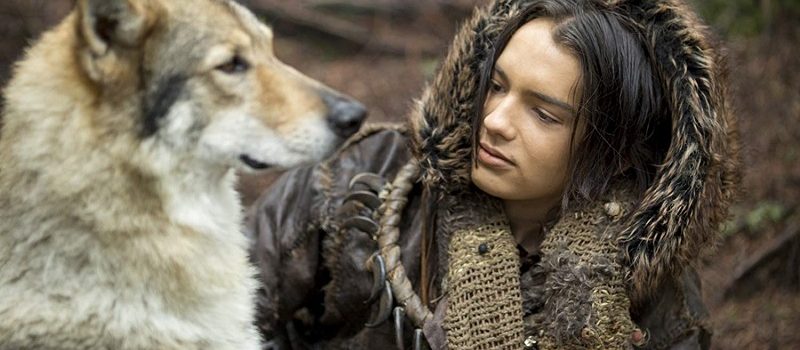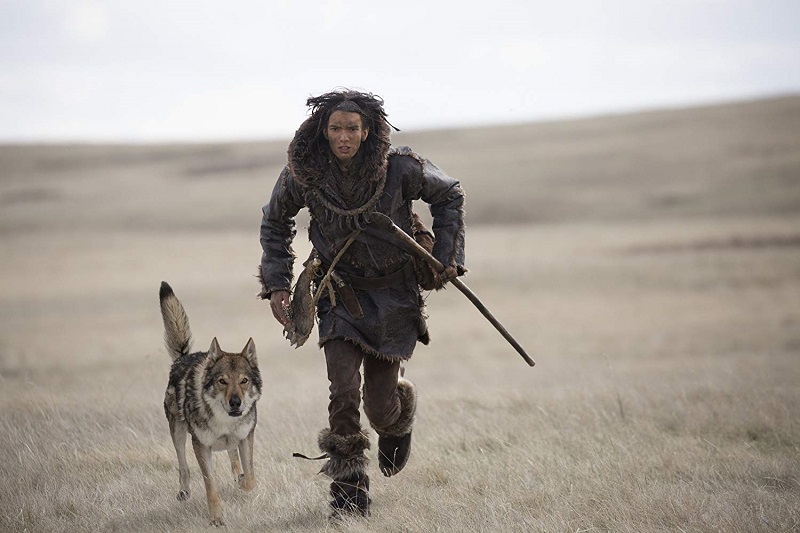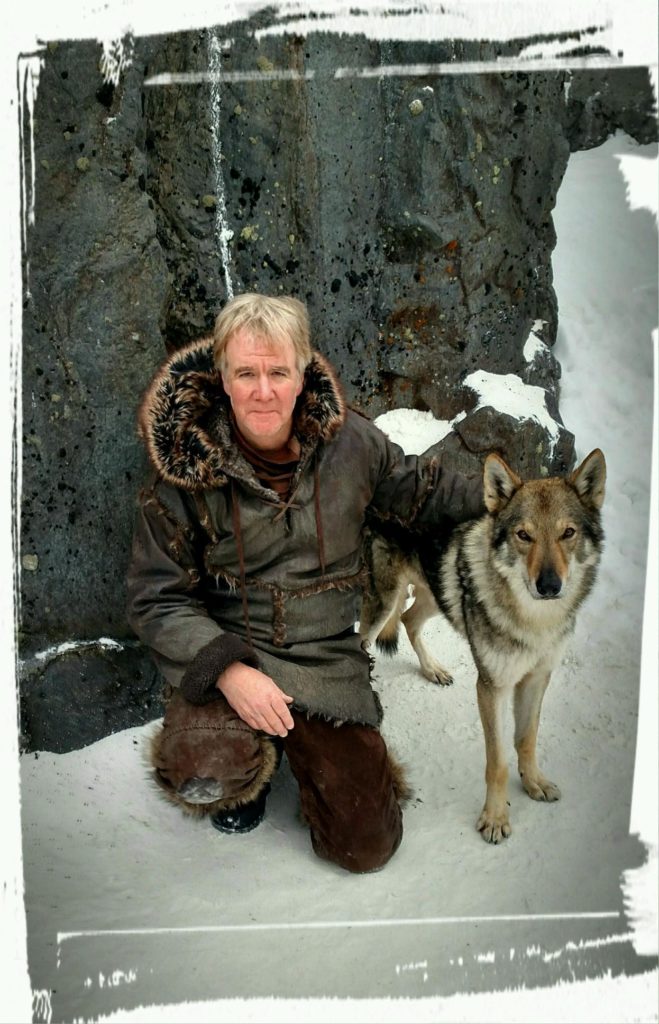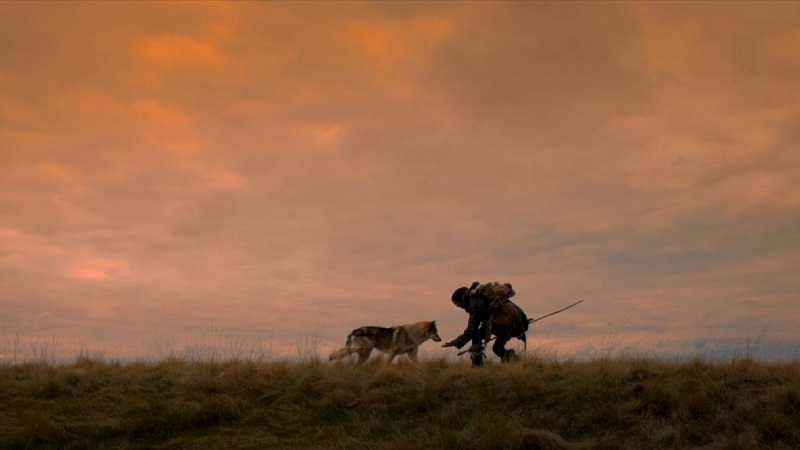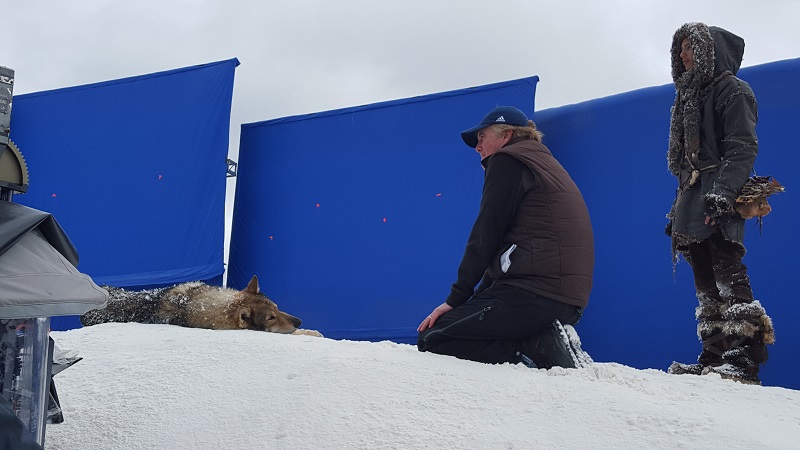Kodi Smit-McPhee is no stranger to large, epic movies, from Dawn of the Planet of the Apes to X-Men: Apocalypse. But there is something unique about the stellar work he turned in as Keda in Alpha. The film is billed as a thrilling narrative that at its heart tells the story of how canines and the human race became best friends. It’s a touching and sensational film and for dog lovers, animal lovers, or simply cinema lovers… an experience that is not to be missed.
Alpha follows Keda, a prehistoric teen who is separated from his tribe and his father on a dangerous buffalo hunt. When he emerges from being unconscious, he is miles from home… but not alone. There is an injured wolf nearby, Alpha. Keda and Alpha find that they both stand a better chance of surviving the elements (winter, for one, is coming and quickly) if they find a way to trust each other. The progression of their relationship is mesmerizing to witness.
The Movie Mensch spoke to animal trainer Mark Forbes for an exclusive chat about the challenges of finding the right dog (or wolf) to portray Alpha, capturing a connection that sets in motion an unconditional love relationship that firmly develops over thousands of years. Forbes shares unique insight with us into the process of working an animal actor and a human actor so that what audiences see on screen feels authentic and most importantly, elicits a powerful emotional response from the viewers.
Forbes has worked with countless varieties of animals, in films from A Dog’s Purpose, We Bought a Zoo and Marley & Me. There was something that had him digging deep in his professional toolkit to achieve greatness that is Alpha. It is a fascinating chat that covers all sorts of topics within the making of Alpha and provides priceless insight into the career of the person on a film set who makes the movie magic for the animal actors who may never have to learn a line but play as important a role as any human.
Don’t miss our theatrical review of Alpha!
The Movie Mensch: This is an extraordinary movie. Anybody who loves dogs should see it. What were your first thoughts of when you got the script—besides thinking what you tactically had to do? How did it emotively hit you as someone who clearly has a love of animals?
Mark Forbes: The thing that really connected about the project was the last page of the script (it is a stunning optic). I had a long conversation with Albert (Hughes), our director, who just wanted me to read the script. I read the script and it wasn’t until that last page of the script that I realized what the movie was about. It hooked me immediately. This whole idea of the genesis of the human-canine relationship was pretty amazing. It still gives me goosebumps. I read the script, called Albert back, and we started talking about how we were going to do this movie where three-quarters of the movie is about the relationship between a kid and a wolf. We went through all the different options—from a wolf, to wolf-dogs to dogs that look like a wolf. I did a lot of research and took a lot of trips to look at different types of dogs and ended up with the Czechoslovakian Wolfdog—which is a cross between a wolf and a German Shepard. That was who we were going to use to play Alpha in the movie.
The Movie Mensch: Finding the right animal is key, sure, but did you work with more than one dog on the set? I know with kids, they like to have twins so that they’re not constantly working.
Mark Forbes: We did. Although, Chuck did about 90-percent of everything. We did have a pack that we worked with, so we had six different of the Czech Wolfdogs that played the pack. Chuck had a double named Zobbie, because you always want to have a back-up. The great thing about that breed is that it was a breed that the Czech military, back in the 1950s, they wanted to make a military dog. So, they bred wolves with German Shepard. It didn’t necessarily work out for them. As opposed to the North American hybrids, which are usually Husky-wolf or Malamute-wolf, the Shepard tends to keep the hybrid looks more wolf like—such as long-legged, lean, much more of a wolf shaped head. It ended up being the right choice.
The Movie Mensch: The conditions appear pretty rough for filmmaking. It appears rough for the actor. How was that a unique challenge for you, working with these trained dogs… specifically Chuck, in those unforgiving conditions.
Mark Forbes: In most films, it would be a hardship. For us, it was a little bit of a blessing. Chuck and the wolf dogs really like that open outdoor, rugged, landscape as opposed to a sound stage. They like being able to see for miles. It was a challenge for the production to get the film crew out to the locations, but I have to say it actually helped the temperament of the wolves.
The Movie Mensch: You work your magic with the animals, at the end of the day it is about the animal and the actor. How much work did you get with Kodi to make it work so well on screen that these two were bonding and then connected?
Mark Forbes: That was a big component in this. Often with a domesticated dog, we’ll work with the actor for a week or two before filming. In this case, not only did we have a natural wolf suspicious—that the hybrid does have—it is also getting the actor being used to the hybrid. We needed more time than we usually have. Kodi came out months before we started shooting. In terms of him working with Chuck, it just takes time. There’s no real shortcut or substitute for time. Then, when we moved to location, we just built it into his schedule for rehearsals and such, he would come and spend a couple of hours a day with us. Again, it was just accumulation of time with him where Chuck got comfortable with Kodi and wouldn’t think twice about walking next to him. There’s that natural wolf apprehension that you have to get over with new people. We worked hard to cement that relationship that you see up there on the screen.
The Movie Mensch: Movies, notoriously, do not shoot in order. Was it a challenge for you and Chuck to film scenes where he’s apprehensive of Kodi and then all of a sudden, you’re shooting a scene where they are like boy and his dog?
Mark Forbes: What we did on Alpha was to get Chuck over that distrust first. We got him to be buds with Kodi. Then, it’s the little acting tricks that help portray the snarl, or the mistrust or backing away. All of those are the trained behaviors are natural—that’s how he really feels about him. That way we can go back and forth between the two as we need.
The Movie Mensch: We have our own theories as to why canines and humans have such a faithful connection. What do you think is that finds dogs and humans are so connected, almost physiologically?
Mark Forbes: It’s amazing, isn’t it?
The Movie Mensch: It sure is…
Mark Forbes: I’ve worked with a lot of different animals and I can say, more than any other animal they really are so suited to fit into the human world. Part of is the pack mentality. They live in a pack and they easily translate that pack over to us where we become part of the pack too. They accept that. There’s rules in the pack and friendships and there’s arguments… all of that. At the end of the day, it’s all about the pack and we are all going to get along. We will work together. That’s the thing that helps so much. There is something more too, because there are other pack animals too, but they haven’t integrated as much as canines into our world. It is interesting. Like I said, I’ve worked with all kinds of animals. With dogs, the pat on the head means as much as the treat does. It’s not like that with other animals. There is that symbiotic relationship with them. We get so much from them and they get so much from us.
Alpha is available now on all home video formats!

